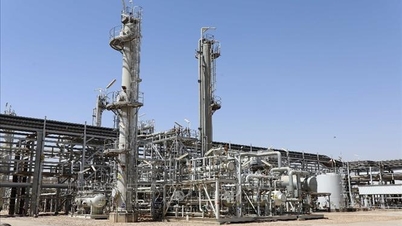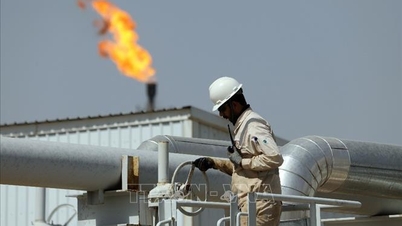At the end of the trading session on June 19, world oil prices increased sharply by nearly 3%, after Israeli Prime Minister Benjamin Netanyahu ordered the military to intensify attacks on Iran. Accordingly, investors are closely watching whether the US will get deeper involved in this conflict or not.
Brent crude rose $2.15, or 2.8%, to $78.85 a barrel, its highest close since late January. U.S. West Texas Intermediate (WTI) crude rose as much as 3.2% to $77.58 a barrel.
Israeli Defense Minister Israel Katz said Prime Minister Netanyahu had ordered the military to attack strategic targets and government facilities in the capital Tehran. Katz said the goal of the airstrikes was to weaken the government of Iran's clerics.

Experts predict that oil prices could reach $90/barrel if geopolitical tensions continue to escalate (Photo: Reuters).
The escalation from Israel came after a missile believed to be from Iran hit a major hospital in the southern Israeli city of Beersheba.
In the US, US President Donald Trump said he is still considering the possibility of ordering an attack on Iran's nuclear facilities. "I may or may not do it. Nobody knows what I will decide," he told reporters on June 18. The White House said the President will make a decision within the next two weeks.
JPMorgan warned that a change of government in a major oil producer like Iran could cause significant volatility in the global oil market. Iran is currently among the top oil producers in OPEC.
Natasha Kaneva, head of commodities research at JPMorgan, said that if Iran were to fall into serious instability, oil prices could remain high for a long time. According to her, supply disruptions in such a scenario would be difficult to restore quickly.
Meanwhile, Goldman Sachs said that an increase of about $10 per barrel due to geopolitical factors is reasonable in the context of declining supply from Iran. The risk of a wider conflict could also push Brent oil prices above the $90/barrel threshold.
Even if tensions in the Middle East ease in the next few days, oil prices are unlikely to return to the $60 level they were at last month, according to Phil Flynn of Price Futures Group. He said the market has underestimated geopolitical risks in recent times and the current conflict has made oil prices "no longer subjective".
However, DBRS Morningstar believes that this oil price increase is only temporary. High oil prices will exacerbate global economic difficulties and restrain consumption. If the conflict does not spread, the difference due to the conflict will gradually decrease and oil prices may cool down again.
Russia also spoke out to reassure the market. Deputy Prime Minister Alexander Novak said at the Saint Petersburg Economic Forum that OPEC countries and their partners should continue to implement plans to increase production as planned, and should not make worrying forecasts in the context of rising summer demand.
Source: https://dantri.com.vn/kinh-doanh/gia-dau-the-gioi-tang-vot-3-do-xung-dot-israel-iran-leo-thang-20250620085802731.htm








































![[Photo] General Secretary To Lam and National Assembly Chairman Tran Thanh Man attend the 80th Anniversary of the Traditional Day of the Vietnamese Inspection Sector](https://vphoto.vietnam.vn/thumb/1200x675/vietnam/resource/IMAGE/2025/11/17/1763356362984_a2-bnd-7940-3561-jpg.webp)








































































Comment (0)